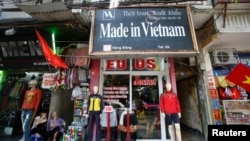On a recent trip to Shanghai, Paiboon Ponsuwanna visited internet companies Alibaba and Weibo, and inspiration struck. The businessman, who lives in Bangkok, already exports goods like frozen seafood, but he would like to bring more commerce home, even if it’s online.
“Maybe we can start doing this kind of thing in Thailand and for ASEAN,” Paiboon said, referring to the Association of Southeast Asian Nations. “I’m thinking about how to do more in ASEAN.”
Although exports sustain many of the economies in developing Asia, people are increasingly looking inward for growth. Asian companies are finding more consumers in their own backyards, rather than just selling abroad, while also asking policymakers to improve the business climate to draw investors to the region.
Asia used to be seen as the “cheap workbench of the world,” according to Sigmar Gabriel, Germany’s federal minister for economic affairs and energy. But now it’s a power in its own right.
“We are deeply impressed with the progress Asia has made in the last 25 years,” Gabriel said at the Asia-Pacific Conference of German Business in Ho Chi Minh City in November.
Trade only among Asian countries has nearly doubled in the past half-century, by some estimates. Part of that is driven by growing interdependence in supply chains.
But trade is also expanding because of demographics. In contrast to the graying populations in the developed world, emerging Asia has a high share of young people. Equally important to merchants is the burgeoning middle class. About 30 percent of the global middle class live in Asia, a proportion estimated to double by 2030.
“It is the youth who consume. It is the middle class who consume,” Philippines finance secretary Cesar Purisima said at the forum. For those reasons, “We can export to each other. We don’t have to export across the world.”
The young population is a mixed blessing for Asia. Some complain that the workforce is not sufficiently educated nor experienced, saying workers should go through more vocational training and increase their English skills to participate in global commerce.
But others see an evolving landscape, as locals enter the job market with more qualifications than their parents.
“The quality of Chinese graduates is rising and rising,” said Frederic Neumann, Hong Kong-based co-head of Asian economics at HSBC Holdings PLC. He said Chinese are no longer “rote” learners but “creative, aggressive and top notch.”
This has led to higher labor costs in China, pushing companies south toward less expensive countries, especially as the Chinese workforce shrinks. But this comes with lower productivity, a challenge that few policymakers in developing Asia have solved.
Adding to the inefficiency of doing business regionally is the dominance of state-owned enterprises, which have favorable access to bank loans, government contracts, land, and permits. Countries like Vietnam and Malaysia are feeling pressure to even the playing field for private competitors in order to join the Trans-Pacific Partnership, a major trade bloc still in negotiations.
Observers question whether these countries have the political will to overcome vested interests and thus deflate the power of state firms. But Neumann said they can learn from China, which was able to curtail state companies in the 1990s in part by co-opting the opposition with benefits, such as allowing them to remain in sponsored housing. Stakeholders who would suffer from the downgrade of state firms could receive training, unemployment payments, and help finding new jobs.
“You have to be smart in selling that politically,” Neumann said.
Besides improving security and health care, developing Asia also needs to work on its legal and physical infrastructure if it is to grow economically, experts say. Foreign investors still worry about corruption, corporate governance, and the enforceability of contracts. They also struggle with logistics, from power shortages to unpaved roads to overwhelmed ports where ships idle because of processing delays.
But officials say it is not just up the government to fix these problems; companies can offer their expertise, for instance, through public-private partnerships.
Vietnam prime minister Nguyen Tan Dung told the conference, full of German investors, “This is a great opportunity for foreign businesses to invest in infrastructure and public projects.”




